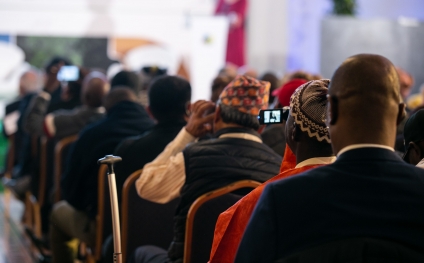29 March was a day of great importance for the WRF. After paying tribute to José Maria Zeberio, who stepped down as President after his impressive work over the last 20 years at the WRF, the General Assembly renewed its Board. The Board now currently comprises:
- FCAE (Federation of Agri-Cooperatives of the basque region): Presidency
- COPROFAM (Confederation of Organizations of Family Farmers from the Expanded Mercosur): Vice-Presidency
- FCI (Cándido Iturriaga Foundation): Secretary
- LK (Laboral Kutxa S.Coop): Treasury
- AFA (Asian Farmers Association): Member
- PDRR (Regional Rural Dialogue Program for Central América and Dominican Republic): Member
- PIFON (Pacific Island Farmers Organisation Network): Member
- PROPAC (Regional Platform of Peasant Organizations of Central Africa): Member
- CIRAD (International Research Centre for Agricultural Development): Member
- SOS-FAIM: Member
- HAZI: Member
- Unesco-Etxea: Member
- UAGA (Farmers Union of Álava): Member
- UPA (Small Farmers Union of Spain): Member
This Board brings together very important agricultural organisations, given that AFA, COPROFAM, PDRR, PIFON and PROPAC together represent more than 31 million family farmers across 4 continents. They are joined by other agricultural organisations such as UPA-Spain, UAGA and ENBA; a benchmark organisation in agricultural research such as CIRAD; entities such as Unesco-Etxea that work to promote the SDGs; entities that carry out an excellent job in Family Farming knowledge management (SOS-FAIM) and a savings and credit cooperative from the Mondragón Group, such as Laboral Kutxa. HAZI and the FCI complete this broad spectrum. The Federation of Agri-Cooperatives of the basque region (FCAE) was elected to the Presidency, with COPROFAM taking the Vice-Presidency.
This new Board represents a significant qualitative leap for the WRF. Firstly, due to its broad representation; secondly, because of its geographical size (5 continents) and, thirdly, because of its diverse and complementary structure.
It should also be noted that there will be a greater number of women in the new Board than in the past. Whereas the former Board of Directors consisted of 10 people, of whom only 2 were women (20%), the new Board of Directors will be composed of 15 representatives, of whom 5 are women (33%). We are improving, although it is also fair for us to recognise that much remains to be done in this area.
Along with renewing the Board, we have added the renewal of the WRF Statutes, which introduces very significant internal changes to our organisation. Among other issues, the aims and activities of our association are being updated. We are clarifying and simplifying the chapter on partners; it calls for the creation of a new quota system and grants greater powers to the Board, which is becoming a key body within our organisation. The statutes also try to better reflect the global character of our organisation.
Within this new framework, and with this new Board, we have already begun the process to design the new WRF Strategic Plan, which will define the way forward for our organisation up to 2025. There are significant challenges for the future but, without a doubt, the opportunities with which we are presented are far greater.



